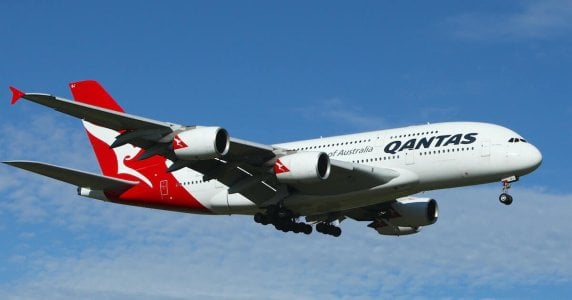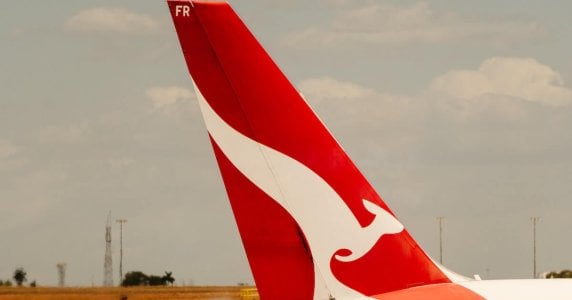Are the new Qantas economy class seats worth it for ultra-long flights?
- Replies 3
Hold on tight, travellers! Revolutionary new changes are coming to our long-haul flights, particularly for those of you who love travelling to faraway places like the US and the UK.
Qantas is promising an experience unlike any other airline in the world when it comes to ultra-long flights. And the best part? It's not just for those sitting in the premium seats.
CEO Alan Joyce recently announced Qantas’ ambitious plans for their ‘Project Sunrise’ flights, which will include non-stop Airbus A350 journeys from Sydney to New York and London starting in 2025.
These flights would not only significantly reduce travel time for passengers but could also reduce traveller’s jet lag by two to four days. It is also believed that this would be one of the longest non-stop flights in the world, clocking in at over 19 hours in duration!
But do these changes benefit economy class passengers as well, or are they only useful for premium passengers?
CEO Joyce has promised that the flights won’t just be for the high-end passengers, ensuring new economy seats will also benefit from the new changes.
How? Let’s take a look.
The key to battling jet lag
Jet lag is the scourge of all air travellers, and although we might have been flying the globe for years with no worry, for those travelling certain distances and routes, it can take a whole week before their natural rhythm resets.
In a radical departure from traditional in-flight practices, Qantas intends to keep cabin lights on for stretches of up to 10 hours, with the aim to help passengers sync up with the time zone of their destination.
While this may initially seem uncomfortable, Qantas has worked closely with sleep specialists and scientists from the University of Sydney’s Charles Perkins Centre (CPC) to ensure these changes will benefit passengers in the long run.
‘Moving from New York to Sydney, the jet lag can be really bad as your body clock doesn’t know whether to adjust by advancing forward or delaying, and it’s difficult to recover,’ said Dr Svetlana Postnova, a Sleep Specialist from the CPC.
Even meal times are getting a makeover! Expect zesty tomato and saffron soup in business class and liberal offerings of chocolate and coffee for those in economy seats to help passengers stay awake during the first half of the flight.
The second meal will be served around seven hours into the journey, which aligns with dinner time in Sydney and allows for a well-timed 10-hour sleep block afterwards. It is assumed that snacks would be provided in between.
‘The scientists have helped us on the lighting and what food we serve to keep people awake…and then to help them sleep,’ Mr Joyce said.
On the physical comfort front, expect to see just 238 seats instead of the usual 300 – and 40 per cent of these seats will either be in first, business, or premium economy. This allows for better legroom and comfort. First-class suites will also be furnished with a bed and separate armchair.
Meanwhile, economy passengers can expect Qantas’ most spacious seating yet, complete with ultra high-definition TVs, Bluetooth and multiple charging stations.
Wi-Fi will also be free for all passengers throughout the plane. The 'well-being zone'—reserved for economy and premium economy guests—will provide extra space for stretches and exercises.
But there is a catch.
A ticket price increase is expected for those who choose to fly non-stop on these ultra-long-haul routes in 2025. Joyce warned that the cost would be roughly 20 per cent more than the price of a one-stop flight.
But for those who would rather pay less and don't mind a layover, the traditional routes will still be available via Singapore or Los Angeles.
 What’s your verdict, members? Given all the information, do you think that the new economy class seat will be worth the extra cost? Do you believe that the new services could reduce passengers’ jet lag? Share your thoughts with us in the comments!
What’s your verdict, members? Given all the information, do you think that the new economy class seat will be worth the extra cost? Do you believe that the new services could reduce passengers’ jet lag? Share your thoughts with us in the comments!
Qantas is promising an experience unlike any other airline in the world when it comes to ultra-long flights. And the best part? It's not just for those sitting in the premium seats.
CEO Alan Joyce recently announced Qantas’ ambitious plans for their ‘Project Sunrise’ flights, which will include non-stop Airbus A350 journeys from Sydney to New York and London starting in 2025.
These flights would not only significantly reduce travel time for passengers but could also reduce traveller’s jet lag by two to four days. It is also believed that this would be one of the longest non-stop flights in the world, clocking in at over 19 hours in duration!
But do these changes benefit economy class passengers as well, or are they only useful for premium passengers?
CEO Joyce has promised that the flights won’t just be for the high-end passengers, ensuring new economy seats will also benefit from the new changes.
How? Let’s take a look.
The key to battling jet lag
Jet lag is the scourge of all air travellers, and although we might have been flying the globe for years with no worry, for those travelling certain distances and routes, it can take a whole week before their natural rhythm resets.
In a radical departure from traditional in-flight practices, Qantas intends to keep cabin lights on for stretches of up to 10 hours, with the aim to help passengers sync up with the time zone of their destination.
While this may initially seem uncomfortable, Qantas has worked closely with sleep specialists and scientists from the University of Sydney’s Charles Perkins Centre (CPC) to ensure these changes will benefit passengers in the long run.
‘Moving from New York to Sydney, the jet lag can be really bad as your body clock doesn’t know whether to adjust by advancing forward or delaying, and it’s difficult to recover,’ said Dr Svetlana Postnova, a Sleep Specialist from the CPC.
Even meal times are getting a makeover! Expect zesty tomato and saffron soup in business class and liberal offerings of chocolate and coffee for those in economy seats to help passengers stay awake during the first half of the flight.
The second meal will be served around seven hours into the journey, which aligns with dinner time in Sydney and allows for a well-timed 10-hour sleep block afterwards. It is assumed that snacks would be provided in between.
‘The scientists have helped us on the lighting and what food we serve to keep people awake…and then to help them sleep,’ Mr Joyce said.
On the physical comfort front, expect to see just 238 seats instead of the usual 300 – and 40 per cent of these seats will either be in first, business, or premium economy. This allows for better legroom and comfort. First-class suites will also be furnished with a bed and separate armchair.
Meanwhile, economy passengers can expect Qantas’ most spacious seating yet, complete with ultra high-definition TVs, Bluetooth and multiple charging stations.
Wi-Fi will also be free for all passengers throughout the plane. The 'well-being zone'—reserved for economy and premium economy guests—will provide extra space for stretches and exercises.
But there is a catch.
A ticket price increase is expected for those who choose to fly non-stop on these ultra-long-haul routes in 2025. Joyce warned that the cost would be roughly 20 per cent more than the price of a one-stop flight.
But for those who would rather pay less and don't mind a layover, the traditional routes will still be available via Singapore or Los Angeles.
Key Takeaways
- Qantas announces radical changes to its ultra-long-haul flights, aiming to reduce passengers' jet lag by two to four days.
- The changes include keeping the cabin lights on for 10-hour stretches during flights to sync passengers with the time zone of their destination.
- New economy seats with ultra-high-definition TVs and an exclusive 'wellness zone' will be introduced on Qantas' Project Sunrise non-stop Airbus A350 flights from Sydney to New York and London in 2025.
- Qantas is collaborating with the University of Sydney's Charles Perkins Centre on initiatives to combat jet lag, such as altered meal times, sleep times, and mild exercise.










